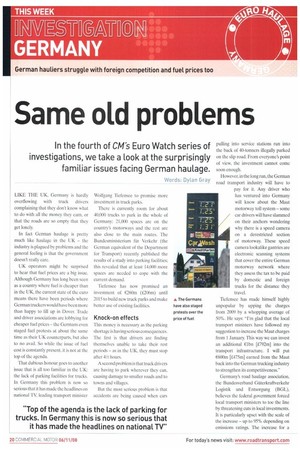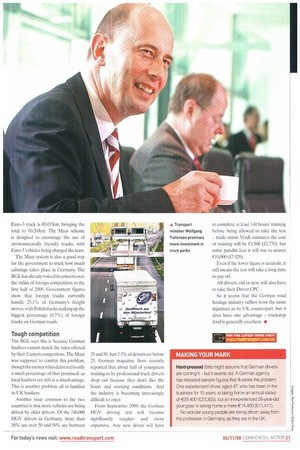Same old problems
Page 20

Page 21

If you've noticed an error in this article please click here to report it so we can fix it.
In the fourth of CM'S Euro Watch series of investigations, we take a look at the surprisingly familiar issues facing German haulage.
Words: Dylan Gray LIKE THE UK, Germany is hardly overflowing with truck drivers complaining that they don't know what to do with all the money they earn, or that the roads are so empty that they get lonely.
In fact German haulage is pretty much like haulage in the UK — the industry is plagued by problems and the general feeling is that the government doesn't really care.
UK operators might be surprised to hear that fuel prices are a big issue. Although Germany has long been seen as a country where fuel is cheaper than in the UK, the current state of the euro means there have been periods where German truckers would have been more than happy to fill up in Dover. Trade and driver associations are lobbying for cheaper fuel prices — the Germans even staged fuel protests at about the same time as their UK counterparts, but also to no avail. So while the issue of fuel cost is constantly present, it is not at the top of the agenda.
That dubious honour goes to another issue that is all too familiar in the UK: the lack of parking facilities for trucks. In Germany this problem is now so serious that it has made the headlines on national TV leading transport minister Wolfgang Tiefensee to promise more investment in truck parks.
There is currently room for about 40,000 trucks to park in the whole of Germany; 21,000 spaces are on the country's motorways and the rest are also close to the main routes. The Bundesministerium fur Verkehr (the German equivalent of the Department for Transport) recently published the results of a study into parking facilities; this revealed that at least 14,000 more spaces are needed to cope with the current demand.
Tiefensee has now promised an investment of €260m (£206m) until 2015 to build new truck parks and make better use of existing facilities.
Knock-on effects This money is necessary as the parking shortage is having serious consequences. The first is that drivers are finding themselves unable to take their rest periods — as in the UK, they must stop after 41/2 hours.
A second problem is that truck drivers are having to park wherever they can, causing damage to smaller roads and to towns and villages.
But the most serious problem is that accidents are being caused when cars pulling into service stations run into the back of 40-tonners illegally parked on the slip road. From everyone's point of view, the investment cannot come soon enough.
However, in the long run, the German road transport industry will have to pay for it. Any driver who has ventured into Germany will know about the Maul motorway toll system — some car drivers will have slammed on their anchors wondering why there is a speed camera on a derestricteid section of motorway. These speed camera lookalike gantries are electronic scanning systems that cover the entire German motorway network where they assess the tax to be paid by domestic and foreign trucks for the distance they travel.
Tiefensee has made himself highly unpopular by upping the charges from 2009 by a whopping average of 50%. He says: "I'm glad that the local transport ministers have followed my suggestion to increase the Maut charges from 1 January. This way we can invest an additional €1bn [092m1 into the transport infrastructure. I will put €600m [£475m1 earned from the Maul back into the German trucking industry to strengthen its competitiveness."
Germany's road haulage association, the Bundesverband Giiterkraftverkehr Logistik und Entsorgung (BGL), believes the federal government forced local transport ministers to toe the line by threatening cuts in local investments. It is particularly upset with the scale of the increase — up to 95% depending on emissions rating. The increase for a Euro-3 truck is €0.07/km, bringing the total to €0.20/km. The Maut scheme is designed to encourage the use of environmentally friendly trucks, with Euro-5 vehicles being charged the least.
The Maut system is also a good way for the government to track how much cabotage takes place in Germany. The BGL has already voiced its concern over the influx of foreign competition in the first half of 2008. Government figures show that foreign trucks currently handle 25.1% of Germany's freight moves, with Polish trucks making up the biggest percentage (8.7%) of foreign trucks on German roads.
Tough competition
The BGL says this is because German hauliers cannot match the rates offered by their Eastern competitors. The Maut was supposed to combat this problem, though the money it has delivered is only a small percentage of that promised, so local hauliers are still at a disadvantage. This is another problem all to familiar to UK hauliers.
Another issue common to the two countries is that more vehicles are being driven by older drivers. Of the 740,000 HGV drivers in Germany, more than 30% are over 50 and 50% are between 35 and 50. Just 2.5% of drivers are below 25. German magazine Stern recently reported that about half of youngsters training to be professional truck drivers drop out because they don't like the hours and working conditions. And the industry is becoming increasingly difficult to enter.
From September 2009, the German HGV driving test will become significantly tougher and more expensive. Any new driver will have to complete at least 140 hours' training before being allowed to take the test — trade union Verdi estimates the cost of training will be €3,500 (2,770), but some pundits fear it will rise to nearer €10,000 (7.920).
Even if the lower figure is accurate, it still means the test will take a long time to pay off.
All drivers, old or new, will also have to take their Driver CPC.
So it seems that the German road haulage industry suffers from the same injustices as its UK counterpart, but it does have one advantage — truckstop food is generally excellent. •




























































































































































